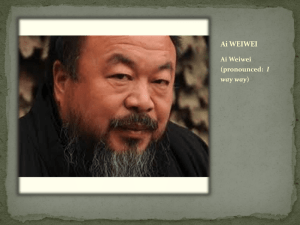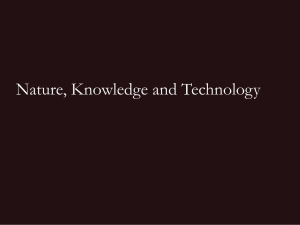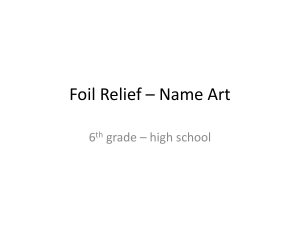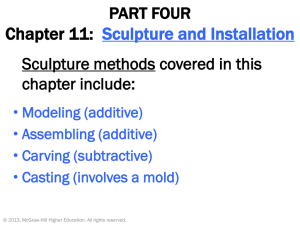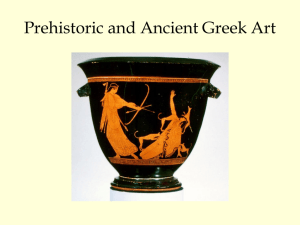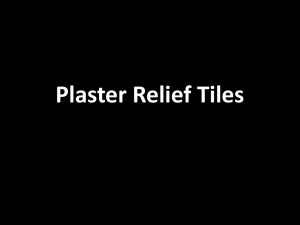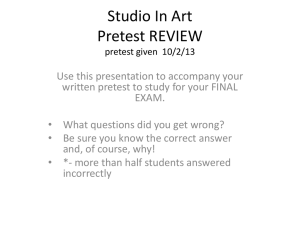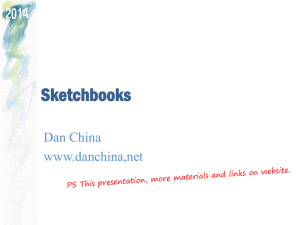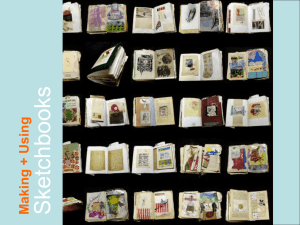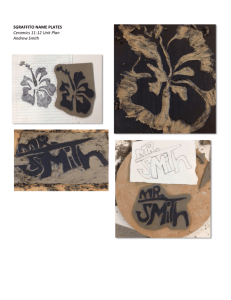Relief *In-the
advertisement
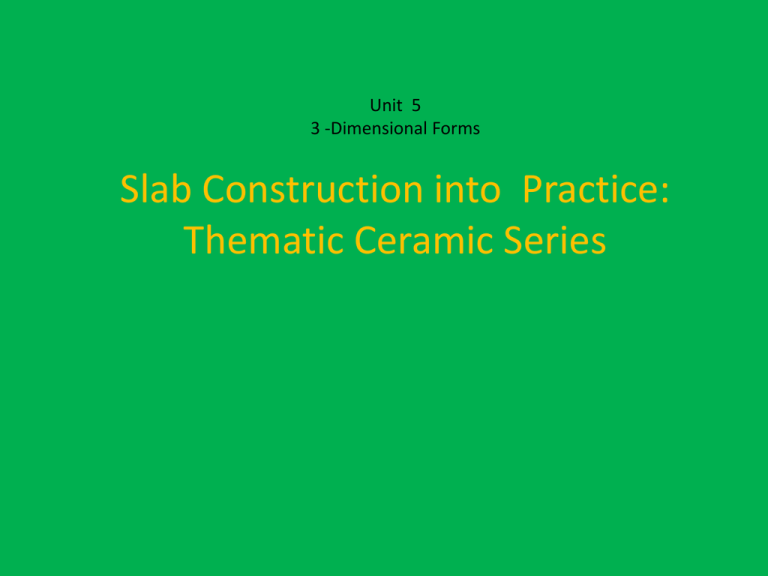
Unit 5 3 -Dimensional Forms Slab Construction into Practice: Thematic Ceramic Series Classifications of Sculpture *Relief *In-the –round Kinetic Environmental Installation Assemblage (*Relief and In-the-Round are the two main classifications of sculpture. ) . *Relief sculpture attached to a background and mainly viewed from one side. High Relief: the forms stand far out from the background. Under-carving. Ara Pacis Augustae, Rome, Italy BAS RELIEF: a sculpture technique in which figures and/or other design elements barely stick out (overall flat) background. Also known as LOW RELIEF. *In – the – Round Sculpture that is fully three- dimensional and intended to be viewed from all sides. ***negative space is just as important as the positive space. The Victory (Nike), Temple of Athena, Ancient Greek The Discus Thrower, Myron, Ancient Greek Baboon and Young, Picasso, 1951 *Kinetic art that moves, a sculpture with a series of moving parts (when blown by the wind or activated by electricity) Alexander Caulder – Mobile Rouge Triomphant Wall sculpture created by Clayton Boyer This sculpture in motion Environmental sculpture that incorporates a portion of the earth or natural surroundings into its design. Andrew Goldsworthy *Installation often indoors and uses the entire space of the viewing area as part of the design. Typically documented by photograph. S a n d y S k o k g l u n d Fox Games Assemblage consists of making artistic compositions by putting together, or assembling, found objects. Picasso, Tête de Taureau Joe Pogan Meret Oppenheim, Fur Cup Other techniques to familiarize yourself with these METHODS of creating sculpture … • *Additive Method – add medium to the sculpture • *Subtractive Method – take away medium (ie carving) • Casting and Molding - take a impression (mold) of an sculpture or object so you have a negative image and fill it with another material that is usually difficult to sculpt on its own (metal, plaster, slip, plastic, fiberglass etc). To make multiples…or for manufacturing. • Modeling – an additive process that using your hands to form and develop (manipulate) the material Unit 5 Ceramic Slab Projects Project 1 – Sgraffito: Small, simple vessel, one color (2-4 days) Project 2 – Relief Tile: No bigger than 10x10 (2-4 days) Project 3 – Birdhouses: Relief and carving (1 week) Theme Choices: Natural/ Realistic or Stylized Nature – landscape, foliage, sea Cultural – based on a specific heritage Classical- based on Greek or Roman Elemental Design – Abstract Design (like Zen designs) Stay away from hobbies, sports, tv/movies, hearts & peace signs….etc. Realistic or Natural Stylized To give something particular flair or artistic style Project 1 Sgraffito Vessel What is Sgraffito? A decoration technique: a technique used to decorate ceramics, in which the top layer (glaze in our case) has patterns scratched into it, revealing the different-colored layer. Project I Sgraffito Vessel Great example… • Vessel is neat and seamless • Work is clean and crisp • Substantial use of line, of varying thicknesses Not good… • • • • Unstable. The base isn’t clean and even. Seams show Sgriffito isn’t obvious…prob because too thin lines, where glaze melted into crevices. Planning: • • • • Brainstorm ideas Find references Develop STYLIZED motifs (sketchbook V) Decide which is best to apply to a three dimensional object. (personal connections are important) Procedure Day 1 – take turns making a slab (approx ¾ inch thick) in which you will cut out a rectangle. – You will create your cylinder vessel. No less than 6 but more than 8 inches in height If you do not get it done in class you will have to come in during your lunch. – Create a base for vessel (same thickness –use scrap slab) – You will place your vessel into the bin. I will try to get it leather hard. - Develop and plan for the relief project (Sketchbook IV- due tomorrow) Day 2 – Glaze only the outside, not the base. (one color – two thin coats) – While waiting approx 10 minutes until glaze is dry, develop, research and plan for Sgraffito design (sketchbook V – due day 3) – Sgraffito Day 3 & 4 – – – – Sgraffito Place Sgraffio Vessel on the appropriate drying rack Roll out tile and place in bin to dry to leather hard Work on birdhouse design. – Ms. Strattan will bisque fire (you can still touch up areas of underglaze) Project II: Relief Tile Natural or Stylized representation of Mythology, Nature, Historical/ Cultural motifs. Project II Relief Tile Procedure: Create a Bas – Relief, High Relief or Combo **Composition should go “off the page” or create complimentary border or combo High relief Use this method to create Vessel Use this method for Relief and Birdhouse Reminder: Marking Period 2 Final Exam Coming up week of 27th • The exam is cumulative – which means EVERYTHING from Day 1 until end of Marking period 2 • Study all quizzes, handouts, sketchbooks. • Review Project Presentations • Review Art History – know most important characteristics and be able to identify from Prehistoric to Realism (11 more movements to go!) • Smile…if you do well, you’re on your way to AWESOME Regent’s Exam grade! Unit 5 Sketchbook Assignments Sketchbook VI: Relief Sculpture Sketches - decide which thematic motif you would like to develop. Find references to use and re-create in each of 6 evenly spaced and sized boxes in your sketchbook. Pencil Only. Each should look like it took much effort and be highly developed- DUE TOMORROW – you will work on Relief sculpture as your vessel dries. Sketchbook V : Exploring Motif and Texture for Sgraffito Vessel decide which thematic motif you would like to develop. Find references to use and re-create in each of 6 evenly spaced RECTANGLE boxes that are sized 2” x4” (to replicate the slab we will be sgraffito) in your sketchbook. Pencil Only. Each should look like it took much effort and be highly developed- DUE the day you will start sgraffito – after glazing. Sketchbook VII: Slab Construction Birdhouse minimum 6 thumbnails to develop a minimum of 2 different ideas. Do thumbnails ahead of time if you value my opinion. After deciding final idea that best fulfills the assignment, render Front, side and rear view to fill at least 2 pages. Value implies form. Sketchbook VII: Types of Sculpture Visual Vocabulary In-The-Round * Kinetic * Installation * Environmental * Assemblage * Relief - Find references of each type of sculpture, print, cut, and paste into sketchbook. Each artwork must include a credit line (artist, date, medium, title, etc.) written small, under the image . Label each type of sculpture and characteristics….use this powerpoint for defs. Decorate it…use INTERESTING font style…color , etc…make it fun to look at! 5 points for exemplary visual appeal and content
